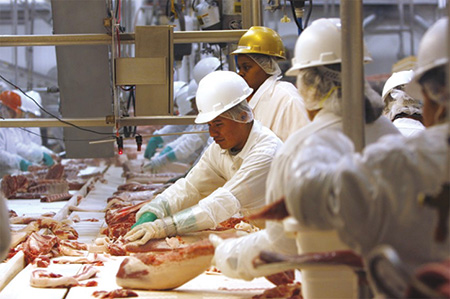
The United Food and Commercial Workers and three of its Minnesota locals, who represent workers at slaughterhouses, and the pro-worker Public Citizen activist group have filed a federal lawsuit challenging a Trump administration move to end limits on the speed of pork slaughter lines. UFCW says the new rule will lead to more injuries among employees and increase the risk of unsafe pork.
The suit, in U.S. District Court in Minnesota, challenges a move by the U.S. Department of Agriculture last month to eliminate maximum speed guidelines – increasing production by an estimated 12.5 percent annually, putting workers at increased risk for injury.
PROFITS OVER SAFETY
USDA estimates the new rule will provide average annual savings of $3.78 million for large plants, putting profits ahead of any reasonable assessment of employee safety.
“Increasing pork plant line speeds not only is a reckless giveaway to giant corporations, it will put thousands of workers in harm’s way,” said Marc Perrone, president of the UFCW, which is joined in the lawsuit by three of its locals and the advocacy group Public Citizen.
“The safety of America’s food and workers is not for sale, and this lawsuit seeks to ensure this dangerous rule is set aside and these companies are held accountable,” Perrone said in a statement.
Meatpacking workers already suffer more than twice the rate of injuries and illnesses as employees in all private businesses, the lawsuit asserts, citing government occupational safety data.
PUTS COMPANIES IN CHARGE OF FOOD SAFETY INSPECTIONS
The regulations also include a “modernized” inspection system in which meatpacking companies would be allowed to handle some of the tasks currently performed by government inspectors.
To put that in perspective, U.S. regulators delegated much of the safety assessment in the development of the troubled Boeing 737 Max – the plane at the center of the deadly crash of Ethiopian Airlines Flight 302 on March 10 and Lion Air Flight 610 last October, to Boeing itself.
An investigation by U.S. Federal Aviation Administration employees warned as early as seven years ago that Boeing had too much sway over safety approvals of new aircraft. A later investigation by Transportation Department auditors confirmed the agency hadn’t done enough to “hold Boeing accountable.”
The new USDA rule would put that same sort of model in place over food safety inspections.
The case is United Food and Commercial Workers Union v. U.S. Department of Agriculture, 19-cv-02660, and is filed in U.S. District Court in Minnesota.
(Information from AFL-CIO Labor Wire, PAI Union News Service and Bloomberg News.)


